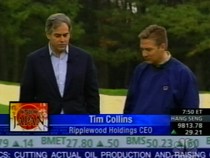CNBC Highlights Successful Business Strategies of Tim Collins '78 in Japan
December 12, 2002
 December 20, 2002, Greencastle, Ind. -
December 20, 2002, Greencastle, Ind. - ![]() [DOWNLOAD VIDEO: "Tim & Tiger" 783KB] "Tim Collins doesn't know a putter from a driver, but that didn't stop him from buying Japan's biggest golf resort, stripping it down and turning it around," CNBC's Tom Costello began a report on Collins, founder and chief executive of Ripplewood Holdings LLC and a 1978 graduate of DePauw University. "And on a cool day in November, some of golf's legends are on hand to play in a tournament and marvel at the renovation." In the report, which aired on the business channel's Squawk Box program today, Tiger Woods and David Duval praise the work of Collins and Ripplewood, with Woods saying, "They've done a heck of a job."
[DOWNLOAD VIDEO: "Tim & Tiger" 783KB] "Tim Collins doesn't know a putter from a driver, but that didn't stop him from buying Japan's biggest golf resort, stripping it down and turning it around," CNBC's Tom Costello began a report on Collins, founder and chief executive of Ripplewood Holdings LLC and a 1978 graduate of DePauw University. "And on a cool day in November, some of golf's legends are on hand to play in a tournament and marvel at the renovation." In the report, which aired on the business channel's Squawk Box program today, Tiger Woods and David Duval praise the work of Collins and Ripplewood, with Woods saying, "They've done a heck of a job."
The Japanese government built the course, the Phoenix Seagaia, for $3 billion, but it was a money loser for ten years. "Ripplewood picked it up at a fire sale price," Costello  reports.
reports. ![]() [DOWNLOAD VIDEO: "The Deal" 882KB] "We paid about $135 million," Collins tells CNBC. "It was about 4% of what it cost to build, and it's a really extraordinary property. The very simple arithmetic is that we are two hours from 200 million people, from Shanghai and Seoul and Tokyo and Osaka." Costello adds that "Collins is betting this former honeymoon getaway can become Japan's premier golf resort."
[DOWNLOAD VIDEO: "The Deal" 882KB] "We paid about $135 million," Collins tells CNBC. "It was about 4% of what it cost to build, and it's a really extraordinary property. The very simple arithmetic is that we are two hours from 200 million people, from Shanghai and Seoul and Tokyo and Osaka." Costello adds that "Collins is betting this former honeymoon getaway can become Japan's premier golf resort."
The challenges Collins faces are a weak economy and a Japanese culture that does not embrace leisure pursuits, such as long vacations at a golf resort. But the report notes that Ripplewood has a history of finding bargains that yield profits. Tokyo's Shinsei Bank (formerly Long Term Credit Bank of Japan) collapsed under bad loans four years ago. "When the government couldn't find a buyer for the bank, it took $37 billion in bad loans off its books and Ripplewood picked it up for $1.2 billion. Shinsei, which means rebirth, became the first foreign-owned Japanese bank," Costello reports. Today, under the policies of Ripplewood, "it's one of the few Japanese banks making money."

![]() [DOWNLOAD VIDEO: "Conservative and Careful" 347KB] “I've been doing this for 13 years,” Collins tells CNBC. “And we've never had an investment that we didn't make money on. It's not because we are geniuses, it's because we have been incredibly conservative and careful.”
[DOWNLOAD VIDEO: "Conservative and Careful" 347KB] “I've been doing this for 13 years,” Collins tells CNBC. “And we've never had an investment that we didn't make money on. It's not because we are geniuses, it's because we have been incredibly conservative and careful.”
Described by reporter Costello as a "philosophy major and ardent Democrat turned modern day shogun," Collins' firm "has $2.5 billion under management in his Japan funds alone." Despite the economic calamity that Japan has been dealing with, Collins says he'll continue to place bets on the country's long-term prospects. ![]() [DOWNLOAD AUDIO: "A Very Simple Bet" 305KB] “Japan is the second largest economy in the world. The financial institutions in Japan own enormous quantities of financial instruments from around the world. So I guess our very simple bet has been that Japan is way too big to fail.”
[DOWNLOAD AUDIO: "A Very Simple Bet" 305KB] “Japan is the second largest economy in the world. The financial institutions in Japan own enormous quantities of financial instruments from around the world. So I guess our very simple bet has been that Japan is way too big to fail.” 
The story points out that Collins makes his deals from his office in New York's Rockefeller Plaza, a building that was sold to Japanese investors twenty years ago when the U.S. economy was reeling and Japan was strong. “I think it's probably not only ironic, but it's prophetic,” Collins tells the network, which closes the report by stating, "Prophetic because 20 years after pundits were writing off the US economy and hailing the Japanese model, Americans are now offering economic and business lessons to the Japanese."
You can read the entire story at MSNBC.com by clicking here.
Tim Collins has been the subject of several stories in Business Week, which calls him a "Star of Asia." Learn more by clicking here.
Source: CNBC
Back